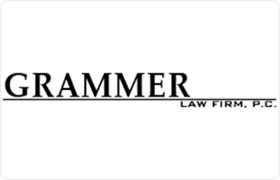 Myrtle Beach Misdemeanor Lawyers, South Carolina
Myrtle Beach Misdemeanor Lawyers, South Carolina
Sponsored Law Firm
-
 x
x

Click For More Info:
-
Grammer Law Firm, P.C.
1700 Oak St Conway, SC 29526» view mapCriminal Proudly Serving Horry County
You need an attorney with criminal defense knowledge who will vigorously protect your rights and interests.
800-957-8401
Not enough matches for Myrtle Beach Misdemeanor lawyer.
Below are all Myrtle Beach Criminal lawyers.
Sponsored Lawyers
1-10 of 31 matches
Criminal
Attorney Lucas grew up in the small town of Great Falls in upstate South Carolina. Following high school, he attended Coastal Carolina University (CCU) in Conway, South Carolina and graduated in 2010 with a bachelor of arts in Political Science and a minor in pre-law. Following graduation from CCU, he accepted a position at the Medical University of South Carolina in Charleston. Shortly thereafter, he was accepted into and began the study of law at the Charleston School of Law, all in an effort to pursue his life-long dream—to practice law in South Carolina. After passing the 2014 South Carolina Bar Exam and moving back to Myrtle Beach, Attorney Lucas had the pleasure of working for several very successful law firms in Horry County. In his time with those firms, he worked cases in many areas of criminal defense, family law, and personal injury law. Specifically, he has defended countless persons accused of all types of crimes during which he tried—and won—their criminal cases; he has handled all types of cases in Family Court; he has negotiated with insurance adjusters and drafted insurance demand packets (some amounting in the millions of dollars) in many personal injury matters. In January 2017, Attorney Lucas felt that it was finally time to take his practice to the next level and opened Lucas Law, LLC right here in Myrtle Beach. If you have been charged with a crime in South Carolina or if you feel that you are being investigated for a crime; or if you have been the victim of any type of personal injury matter such as a car accident, a slip and fall, or being the victim of a crime, do not hesitate to give Lucas Law, LLC a call at 803-374-0389 and Attorney Lucas will do everything in his power to give you the representation and get you the compensation that you deserve. Additionally, feel free to click on the tab(s) at the top of the page that correspond with the service that you require. Hopefully, the content found there will give you a better understanding of what your next steps should be and how Lucas Law, LLC can assist you in resolving the matter.
(more)Divorce & Family Law, Criminal, Traffic, Business, Immigration
If you have been injured or are disabled, give me a call. If you need legal advice before you sign a contract, enter into a lease, or sign a business deal, give me a call. If you are being sued by someone and need to know how to respond to the lawsuit, give me a call. If you have been arrested or charged with a traffic violation, give me a call. Not sure if you need a lawyer? Give me a call. David was admitted to the South Carolina Bar in 1987. He currently practices law from his office in Surfside Beach, South Carolina.
(more)Accident & Injury, Divorce & Family Law, Criminal, Class Action
Bill Hopkins was born and raised in Bishopville, South Carolina. He attended North Carolina State University where he received his B.S. degree in Textile Chemistry in 1988. After graduation, Bill worked for nearly three years for Springs Industries, Inc., a large textile company, at a dyeing and finishing plant in Lancaster, South Carolina. Bill was working as a third shift superintendent at the time he was accepted into law school at the University of South Carolina. During law school, Bill served as the Research Editor for the South Carolina Environmental Law Journal. It was also during law school that he began clerking for the law firm of Whaley, McCutchen, Blanton & Rhodes, LLP, one of the oldest and most prestigious litigation firms in South Carolina, which had originally been founded in 1936. Bill continued to work at the firm after graduation and ultimately became a partner in the firm and then was elected Managing Partner in 2005. Bill and the firm were selected by South Carolina Attorney General Henry McMaster to represent the State of South Carolina in lawsuits brought against several pharmaceutical companies regarding their reporting of false and inflated prices for drugs which resulted in overpayments by the State Medicaid and State Health Plan programs, known as the AWP litigation. Bill remained as the Managing Partner until December 31, 2007 when the firm dissolved after 71 years of continuous practice. Bill founded and started a new law firm called McCutchen Blanton Hopkins & Campbell, LLP, where he continued to practice with Thomas McCutchen and Hoover Blanton, two of the most well known leaders and stewards of the South Carolina Bar. Bill ran this law firm until November 1, 2010, when he joined the national law firm Beasley Allen Crow Methvin Portis & Miles, P.C. in Mongomery, Alabama in the Consumer Fraud section with an emphasis and focus on class action litigation. Bill has been active in various bar associations and organizations, including the South Carolina Bar. At the time he joined Beasley Allen, Bill was serving on the Professional Responsibility Committee and the Conventions Committee of the South Carolina Bar. Bill is currently serving as the Co-Chairman of the Class Action Litigation Group of the American Association for Justice. Bill served as the Chairman of the Employment Rights Section of the South Carolina Association for Justice for three years. In 2010 Bill Hopkins was elected to the South Carolina Chapter of the American Board of Trial Advocates (ABOTA), which is a distinct recognition and privilege. ABOTA is a national organization of both plaintiff and defense trial attorneys which is committed to the preservation of trial by jury. To be eligible for consideration, an attorney must have tried at least 20 civil jury trials to jury verdict as lead counsel. Bill has tried over 70 civil cases to jury verdict as sole or lead counsel, in areas such as personal injury, business torts, fraud, products liability, trade secrets, unfair trade practices, insurance matters and employment. Bill has also had an active appellate practice and has argued 8 cases before the Fourth Circuit Court of Appeals, including an en banc argument in the case of Ocheltree v. Scollon Productions, Inc., a seminal case regarding the law of sexual harassment, in which many organizations (including the EEOC) made appearances and submitted amicus briefs, and which case was the subject of numerous articles, including an article in the New York Times. Bill has also argued several cases before the South Carolina Court of Appeals and the South Carolina Supreme Court. Bill has also developed a successful class action practice, being appointed by several different courts as lead counsel or liaison counsel in many different class action cases.
(more)


 William Grammer Myrtle Beach, SC
William Grammer Myrtle Beach, SC AboutGrammer Law Firm, P.C.
AboutGrammer Law Firm, P.C. Practice AreasExpertise
Practice AreasExpertise




